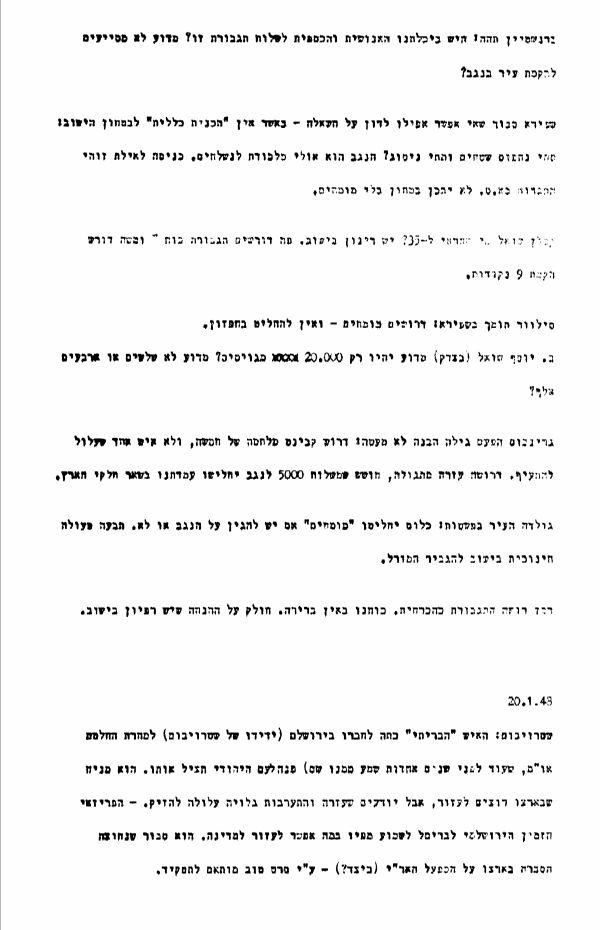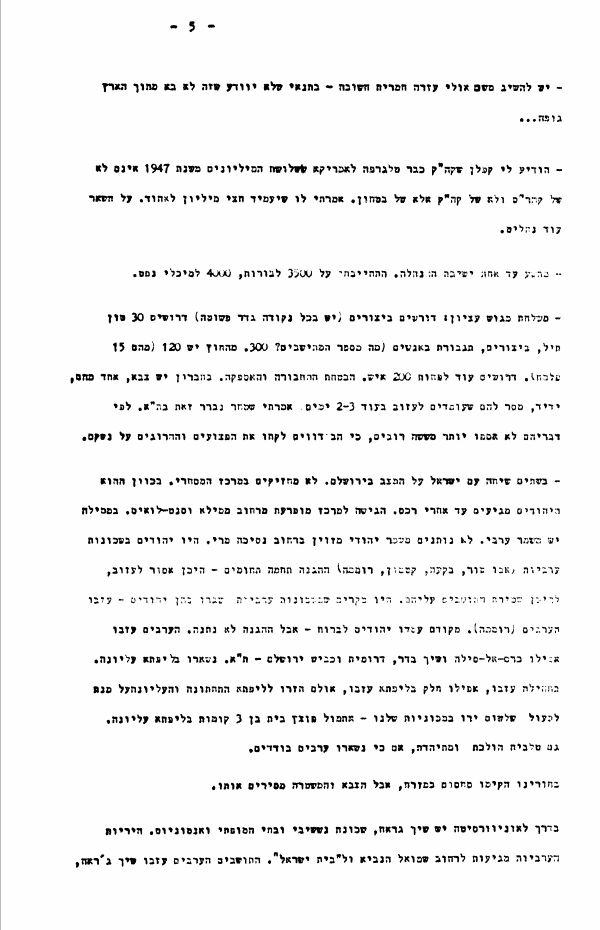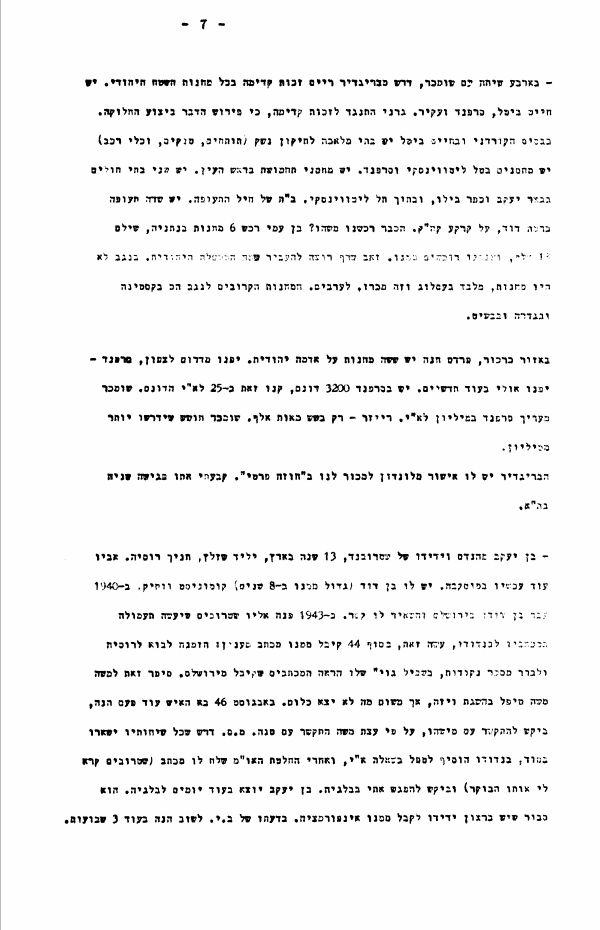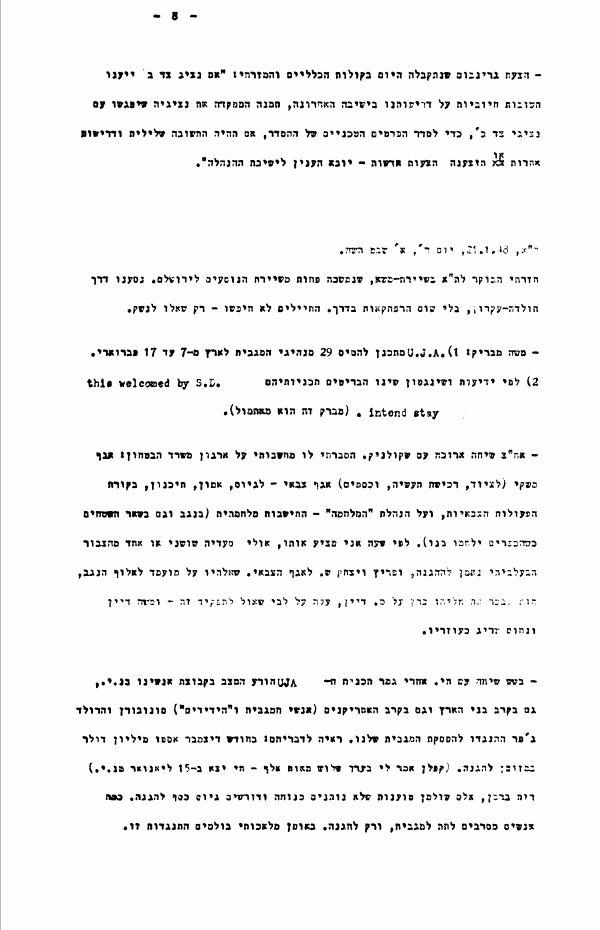1
of
Places:
Bruxelles
Jerusalem
Hebron
Amir
Lifta
Jaffa
Gaza
Haifa
Sarafand
Tzrifin
Be'er Ya'akov
Tel HaShomer
Rosh Ha'Ayin
Ramat David
Netanya
Bashshit
Gedera
Karkur
London
Belgium
Moscow
People:
The use of the photograph is subject to the Copyright Law, 2007
20.01.1948
225349
[Tuesday], 20 January 1948 Stroiboehm [sp.]: The man in the “Union” [USSR] wrote to his friend in Jerusalem (Stroiboehm’s friend) the day after the UN resolution, [saying] that a just few years earlier he’d heard from him that having a nesting place would save the Jewish people. He assumes that in his country they want to help, but they know that visible help and intervention could cause harm. The Parisian invited the Jerusalemite to Brussels, to hear from him how to help the state. He believes that hasbara [explanation, public relations] regarding the Eretz-Israeli enterprise is needed in his country. How? – By way of a good film adapted to the purpose. Maybe important material help can be secured – on the condition that it not become known that it didn’t come from within the country itself…. – Kaplan informed me that KKL [Keren Kayemet LeIsrael – the Jewish National Fund] has already telegraphed America that the three million from 1947 are neither for Keren HaYesod nor KKL, but for security. I told him to make half a million available to Ehud [Avriel]. We’ll decide on the rest later. – Executive meeting from nine to one. I committed P£ 3,500 for pits [cisterns], 4,000 for oil tanks [to Jerusalem]. – Delegation from the Etsiyyon Bloc: They need fortifications (each settlement has a simple fence), 30 tons barbed wire, fortifications, personnel reinforcement (how many settlers are there? – 300). From outside there are 120 (15 of them Palmach). They need at least another 200 men, protection for transport and supplies. In Hebron there’s [a British] army [presence]. One of them, a friend, told them that they’re about to leave in 2-3 days. I said that tomorrow we’ll clarify this in Tel Aviv. According to them they didn’t collect more than six rifles, because the Bedouins took the wounded and the dead along with their weapons. – At two a talk with Yisrael [Amir] about the situation in Jerusalem. They don’t have control of the commercial center. In that direction, the Jews reach past Rex [Theater]. Access to the center is disrupted from Mamilla Street [today – Agron Street] and St. Louis [Julian Road, today – King David Street]. There’s an Arab guard in Mamilla. [The authorities] aren’t allowing an armed Jewish guard on Princess Mary Avenue [today – ShlomTsiyon HaMalka]. There were Jews in Arab neighborhoods (Abu Tor, Baq’a, Katamon, Romema). The Haganah delineated areas – where leaving is prohibited, and where protection of the residents falls to them [Haganah fighters]. There were cases of Arabs leaving Arab neighborhoods in which Jews lived (Romema). Earlier Jews were about to flee – but the Haganah didn’t let them. The Arabs even left Karm al-Sila [sp.] and Sheikh Badr [today – Binyenei HaUma (International Convention Center), Giv’at Ram, and the government complex] south of the Jerusalem-Tel Aviv road. In Upper Lifta [western Romema] they stayed. At first they left. Even some of [the Arabs in] Lifta left, but they returned to Upper and Lower Lifta to take action. Two days ago they fired on a vehicle of ours. Yesterday a 3-story building in Upper Lifta was blown up. Talbiyya is also becoming more Jewish, although individual Arabs remain. Our men set up a barricade in East [Jerusalem], but the army and police are taking it down. On the way to the university [Mt. Scopus] – Sheikh Jarrah, the neighborhood of Nashashibi, and the Mufti’s and Antonius’s houses. The Arabs’ gunfire reaches Shmuel HaNavi Street and [the neighborhood of] Bet Yisrael. The Arab [residents] left Sheikh Jarrah, but the gangs entered the abandoned homes. There were problems with the [city’s] internal transport. Evacuating Arab Romema eased [the transport]. Two routes are still under threat – to the university and Hadassah, and to Talpiot, Ramat Rahel, and Mekor Haim. They had to change the route to Talpiot [and drive] not via Hebron Road but eastward, on the road to [Armon] HaNatsiv. The attacks also came from near the train station, from Abu Tor. Arab guards were in charge of protecting the government press and the station. Now the army is protecting the barricade and the route is a little safe[r], but [our people] only travel by armored vehicles. One neighborhood that suffered a lot is Mekor Haim (which has a sanatorium for tuberculosis patients). To its south is the village of Beit Safafa. The village houses border on Jewish houses. North of Mekor Haim is the Arab neighborhood of Al-Baq’a. To the west – Katamon. Only six families remain in Mekor Haim. The patients were removed from the sanatorium. Our men entered the homes. Many also left Talpiot because of transport difficulties, and our men are now there and in Havat HaLimud [girls’ agricultural school]. Mekor Haim and Talpiot are to be fenced off – and maybe then the residents will return, if there are enough armored buses. No Arab has entered our neighborhoods. Yemin Moshe is also a front – [making things] hard for the Arabs. It poses a threat to Hebron Road and Jaffa Gate. There were some attacks on Yemin Moshe – but [the residents] didn’t leave. The homes are very old and easy to defend. But the place needs fortification (our neighborhoods in Jerusalem have not yet been fortified). [We] want to install barbed wire from the edge of Gaza Road through Neve Sha’anan to the workers’ neighborhoods in Bet HaKerem, spanning 2-3 km (about 12 tons of barbed wire). The Arab Legion is still stationed near Zion Gate. About 170-200 of our fighters are stationed in the Old City. From time to time they’re searched and their weapons are taken away. In all, 800 men have been conscripted in Jerusalem, excluding the garrison force, [in total (counting garrison)] about a thousand men. In Hartuv there are 50 men and their weapons (overload), but they need 100 men with weapons. Neve Ya’akov and ‘Atarot are in a difficult situation. Each settlement needs an armored vehicle, fortifications, men, and weapons. – At 4 a talk with [Max] Schumacher. He asked Brigadier Hayes for preference in [purchasing] all the camps [British bases] on Jewish territory. [These are] Khayat Beach [in Haifa], Sarafand (Tzrifin), and ‘Akir [Tel Nof]. [First Secretary] Gurney objected to granting preference because this amounts to implementing the partition. The Kurdani base [in Zebulun Harbor] and Khayat Beach have weapon repair workshops (for cannons, tanks, and vehicles). Tel Litvinsky [Tel HaShomer] and Sarafand have depots. There are ammunition depots in Rosh Ha’Ayin. There are two hospitals, in Be’er Ya’akov and Kefar Bilu, and within Tel Litvinsky (an air force hospital [today – Sheba Medical Center]). There’s an airfield in Ramat David, on KKL land. Have we purchased anything yet? – [Oved] Ben-Ami purchased six camps in Netanya, paid P£ 18,000, and we’re buying [them] from him. Ze’ev Sherf wants to transfer the Jewish government there [to Netanya]. There were no camps in the Negev aside from ‘Isluj, which they sold to the Arabs. The camps near the Negev are in Kastina [near Be’er Tuvia], Gedera, and Bashshit [west of Gedera]. Around Karkur – Pardes Hannah there are six camps on Jewish land. They’ll be evacuated from south to north. Sarafand might be evacuated in two months. In Sarafand there are 3,200 dunams that were bought at P£ 25 per dunam. Schumacher estimates Sarafand at P£ 1 million. [Ya’akov] Reiser – at only 600,000. Schumacher’s afraid they’ll demand more than a million. The brigadier has authorization from London to sell to us by “private contract.” I scheduled a second meeting with him in Tel Aviv. – Ben-Ya’akov, an engineer and friend of Stroiboehm [sp.], came. 13 years in the country, born in Siedlce, educated in Russia. His father’s still in Moscow. He has a cousin (8 years older than him) a longtime communist. In 1940 his cousin passed through Jerusalem and left him contact information. In 1943 Stroiboehm [sp.] suggested that Ben-Ya’akov use his correspondence with his cousin for propaganda purposes. He did so. In late 1944 he received an interesting letter from him: an invitation to come to Russia and clarify a few points for a gentile to whom he’d shown the letters that he received from Jerusalem. He told Moshe [Sharett] about this. Moshe secured a visa, but for some reason nothing came of this. In August ’46 the man came here again and asked to be put in touch with someone. At Moshe’s suggestion he was put in touch with [Moshe] Sneh. Sneh insisted that all his conversations remain confidential. His cousin continued to handle the question of Eretz Israel, and after the UN resolution sent him a letter (which Stroiboehm [sp.] read to me this morning) asking to meet him in Belgium. Ben-Ya’akov is leaving for Belgium in two days. He believes that his friend wants to receive information from him. He intends to return in 3 weeks. – Gruenbaum’s proposal, approved today with the votes of the General [Zionists] and HaMizrachi: “If representatives of Side B [ETZEL and LEHI] respond affirmatively to our demands from the last meeting, the headquarters will appoint representatives on its behalf to meet with representatives of Side B, in order to sort out the technical details of the arrangement. If the response to specific demands is negative or if new proposals are presented – the matter will be brought to a meeting of the Executive.”













